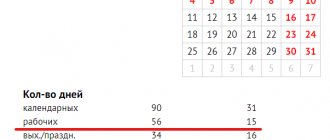"Pitfalls" of a gray salary
This type of salary is beneficial to the employer who optimizes the costs of his company. In a sense, it is also beneficial to the employee, since it allows him to seriously save on deductions from the white part, usually equal to the minimum level allowed by law.
But there are also pitfalls here.
- Receiving a large part of the salary in an envelope for an employee who accepts the terms of the game is certainly pleasant. But only if the employer has a loyal attitude towards the employee. If a labor dispute or conflict situation arises between them, and the organization has financial difficulties, the salary is cut to its official part;
- It is from the white part of the salary that contributions are made to the Pension Fund , which negatively affects the insurance period and the size of the future pension; and it is precisely this that is the “guideline” when calculating benefits upon dismissal or maternity leave;
- Taking sick leave becomes a problem and is fraught with conflicts with the employer. The fact is that payment for those days during which the employee was on sick leave is compensated to the employer from the Social Insurance Fund.
This amount is taken from the contributions transferred there by the employer when paying the official salary. Since the white part of the gray salary is usually small, the employer is forced to pay contributions in full out of his own pocket, and he can forget about state compensation. Naturally, he is not delighted by this;
- a problem for the employee , because banks pay attention primarily to the official part of the salary. Of course, the low income of a potential client is not a reason to refuse him, but also not a reason to lend him a serious amount of money for a long period. And the lower the official income, the less chance of getting a large loan, and the higher the interest rate will be.
Of course, one can hope for the integrity of the employer who calculates social benefits from the actual amount of the employee’s salary, but such things, as a rule, are agreed upon verbally.
As a last resort, the employer can even promise the employee that he is ready to make his salary completely official, provided that his own expenses for the employee do not increase.
However, with this option, all contributions will be calculated from the employee’s salary. And after deducting from his salary not only personal income tax, but also the unified social tax, the latter will decrease significantly.
Salary in an envelope, what to do
Unfortunately, today “salary in an envelope” remains a rather common phenomenon.
At the same time, the employer saves on taxes, but the state and the employee lose. In particular, the state receives less revenue to the budget, and the employee receives a lower salary, which subsequently reduces his age pension. If the employee works illegally, then he will not be accrued seniority, and naturally he will not receive an old-age pension or will receive it in a smaller amount. Employers are taking this step deliberately due to the economic crisis, decreased profitability of the enterprise, and insolvency. In this case, the employee receives wages in an envelope that are much more than what is indicated in the pay slips at work. This procedure for payments is called “black” accounting, while payments according to official documents are called “white” accounting.
Gray salary: where to complain?
The best option here is one: disagree . But often job seekers, especially those working in trade, construction and manufacturing industries, prefer to sell their labor as high as possible and live in the interests of the current moment, without thinking about the future.
Nevertheless, it is possible to fight gray wages. Here are the main ways to fight:
- Contacting the tax office at the location of the employing organization. It is better if the complaint is not anonymous. After receiving a signal, the Federal Tax Service conducts a surprise check, seizes documents (statements, expense orders, payment orders, bank statements), and sometimes hard drives from computers in order to search for the management base.
Bank accounts are checked by tax inspectors, employees are interrogated, examinations are carried out, the correspondence of the actual volume of work with the volume of work declared by the organization is determined, etc. Tax inspectors can report detected violations to the investigative committee. And the materials they collect can be brought to court;
- Contact the prosecutor's office at the location of the organization. It is recommended to attach letters from the Pension Fund to the corresponding application, complaining about the small amount of contributions to it;
- Contacting the labor inspectorate.
If the case goes to court, the employee has the right to present evidence of his own innocence.
Advantages and disadvantages of salary in an envelope
Any transaction contains both positive and negative sides. Labor relations that are not formally documented (agreement) represent the same transaction, but they are reflected differently.
Party – employee
It should be noted that on the one hand, both parties have a financial advantage - such as the absence of payments for insurance premiums and taxes. An employee, for example, may thus not pay alimony or reduce payments for other obligations.
But at the same time, the employee must know and realize that if he wants to go on vacation, and also if he gets sick, these days will not be paid for by the organization. The same applies to maternity and other benefits. While the white type of remuneration provides for these payments.
Significant disadvantages include:
- The minimum paid in the Russian Pension Fund means that upon retirement, a person will receive a living wage, no more.
- If an employee decides to quit, it is unlikely that they will be able to get their paychecks back.
- If the fact of concealment of income is established, such an employee will bear full responsibility under the Criminal Code of the Russian Federation.
- Lack of guarantees in social benefits.
- You cannot take out loans, because... There is nothing to officially confirm the income.
Party - employer
An organization, be it an LLC or an individual entrepreneur, is responsible to many government services: tax inspectorate, Pension Fund of Russia, insurance organization, etc. One of the most important obligations in labor relations is the payment of wages and related contributions.
Thus, the lower the final salary amount, the less the organization will pay in mandatory contributions. In view of this, many companies negotiate with employees on the payment of black wages. Naturally, this is due to profit.
Also, such an agreement allows the employer not to fulfill the conditions prescribed in the Labor Code of the Russian Federation - compensation for vacation, sick leave payments, maternity leave, etc.
To summarize, we can conclude that it is beneficial for the employer to pay wages in an envelope.
And various fines and criminal liability for concealing income are not scary, because... Few employees will write a complaint to the Labor Inspectorate about violations of their rights. That is why employers should not be afraid, because... They believe that the employee is simply afraid of losing even the small money that he is paid.
How to prove a gray salary?
Evidence that can convince the court is:
- testimony, if the witnesses can name the exact amount of income paid and the exact period for which it was paid, if the testimony itself was taken as part of a tax audit by inspectors, and not as part of search activities by operatives, and if the witnesses talk about facts that happened during the period being audited ;
- vacancy announcements, if they relate strictly to the period under review;
- materials collected as a result of a tax audit, if it is proven that they belong specifically to the specific organization being audited, and specific authorized persons of the organization had a hand in them, and if it is clearly visible from them which employee, in what amount and for what period received wages;
- comparison of the official salary of an employee with the average salary of other workers of the same profession in the region;
- provision of audio, video recordings and photographs recording the violation;
- provision of statements that reflect gray regular payments.
- Naturally, the employer cannot be accused of fraud with the payment of wages: even if in a smaller amount, it is paid. Other claims are made against him.
You can find out what a black salary is and how it differs from a gray one in our new article.
Piece-rate wage system. Here you can read about what it is and what types of piecework systems exist, and also find out what the advantages and disadvantages of such a remuneration system are for the employer and employees.
Consequences of receiving salaries in envelopes
One cannot but agree that the consequence of unofficial payments will be negative if part of the salary in the envelope is not subject to taxes. If the salary in the envelope is unofficial, the employee is afraid of losing his job or the favor of his superiors. However, then such behavior is fraught with negative consequences for him.
Firstly, the employer can terminate the contract at any time without paying him the actual cost of the work, but limit himself to paying “white” earnings.
Secondly, upon dismissal, he will be paid compensation for unused vacation, based on the calculation of the average monthly salary, which was paid officially.
Thirdly, when vacation time comes, it is unlikely that the employee will receive a “black” salary as vacation pay; most likely, he will be given the amount due to the average monthly official earnings, and they will explain that they have such rules.
Fourthly, in the event of maternity leave, the employee will be paid maternity benefits in the amount of the average monthly salary from the “white” cash register, thereby depriving the employee of the well-deserved amount of benefits.
Fifthly, if an employee is laid off, he may lose severance pay in the current amount of average monthly earnings; he will only be paid the official part of the money, citing financial difficulties.
You may not be paid severance pay, disability benefits, vacation pay, maternity pay, compensation for unused vacation, or back pay if you worked illegally without official employment and received only a “gray” salary.
What are the consequences of paying gray wages for employers?
The accrual of gray wages is, first of all, a violation of tax laws : clause 4 of Art. 226 of the Tax Code of the Russian Federation on the withholding of personal income tax by the tax agent from actual cash payments; Art. 122 of the Tax Code of the Russian Federation - non-payment or incomplete payment of tax amounts due to an understated tax base, incorrect tax calculation and other unlawful actions or inactions.
In the latter case, if the violation was committed unintentionally, the organization will be obliged to pay 20% of the amount of tax that was not paid. If the intentionality of the violation is proven, the fine will increase to 40%.
The discovery of a system of salaries in envelopes is fraught for the employer with a call to the “salary” commission , consisting of tax specialists and municipal officials. The organization is subject to full on-site inspections by the Department of Internal Affairs, the prosecutor's office, the Social Insurance Fund, etc. and will be required to pay all unpaid taxes, as well as penalties and fines.
Criminal liability under Art. 199 of the Criminal Code of the Russian Federation for a person or group of persons, from taxes, without providing a tax return or other documents provided for by law, or by introducing knowingly false information into these documents.
Most often, the head of the organization, the chief accountant and employees who draw up primary documents, who can be considered accomplices, are called to account.
What punishment does the employer face?
If an employer pays wages in envelopes, then he is taking a certain risk. After all, these are violations of the law. If this happens, and the employee does not agree with such a turn, or the amount in the envelope is not what was originally agreed upon, then the employer may face serious problems. Namely, the employer can be held administratively liable based on Articles 122 and 123 of the Tax Code of the Russian Federation. This type of punishment implies the imposition of a fine in the amount of 20% of the amount of unpaid taxes from the identified amount that was paid or should have been paid in an envelope.
In addition, the employer may be subject to another administrative penalty. According to Article 27 of the Federal Law “On Compulsory Pension Insurance”. If the employee receives payment in an envelope, but accordingly there is no question of any pension contribution, and according to the law this is a serious violation. Such a violation involves a fine of 5 to 10 thousand rubles.
The options written above are quite loyal to the offender, and in case of non-payment of taxes and pension fees, the amount of which is considered particularly large, a decision on criminal liability may be made. This punishment is implied by Article 199 of the Criminal Code. A particularly large amount means 2 million rubles of unpaid taxes to the state, but if the unpaid taxes exceed 10% of the total amount that must be reimbursed.
The article implies the following penalties:
- a fine in the amount of 100 thousand to 300 thousand rubles;
- correctional labor for up to 24 months;
- imprisonment up to 2 years;
- arrest for up to six months.
But under certain circumstances, the amount of the fine may be increased to 500 thousand rubles. In practice, less than 5% of violators are actually deprived of their freedom, usually this is either a suspended sentence or payment of a fine.
If an employee sues the employer because wages, although unpaid, were not paid, then civil liability arises. In this state of affairs, the employee must sue and prove his case. If the claim is filed correctly and there is irrefutable evidence, the employee has every chance of winning the case and receiving the debt; this is described in more detail below in the article.
Is there any threat to an ordinary worker?
“Salary” commissions do not threaten such things. At the same time, if the employer does not withhold tax from their income, they themselves are obliged to fill out a tax return by April 30 of the following year and pay all taxes themselves by July 15.
Legally, no one exempts an employee from paying personal income tax , so according to clause 1 of Art. 228 of the Tax Code of the Russian Federation, he is simply obliged to calculate it and pay it himself. Otherwise, he is also subject to liability based on the results of a tax audit.
Don't forget to add "FBM.ru" to your news sources






